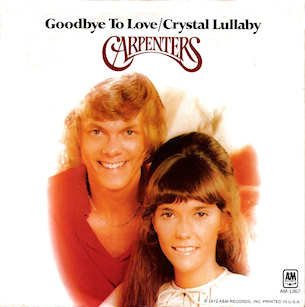ScottyB
Well-Known Member
Again, remember the 45 in the house, but don't recall radio airplay.
This is one of my all-time favorites.
Didn't know it at the time,
but during the mid-80's to the mid 90's....all those great power ballads that were being played...
likely had their rooted origins in the arrangement of this song.
It has been reported that "Goodbye To Love" was the prototype to the power ballad.
Simon Frith, the British sociomusicologist and former rock critic, identifies the origins of the power ballad in the emotional singing of soul artists, particularly Ray Charles, and the adaptation of this style by performers such as Eric Burdon, Tom Jones, and Joe Cocker to produce slow-tempo songs often building to a loud and emotive chorus backed by drums, electric guitars, and sometimes choirs.[13] According to Charles Aaron, power ballads came into existence in the early 1970s, when rock stars attempted to convey profound messages to audiences.[14]
Aaron argues that the power ballad broke into the mainstream of American consciousness in 1976 as FM radio gave a new lease of life to earlier songs such as Led Zeppelin's "Stairway to Heaven" (1971), Aerosmith's "Dream On" (1973), and Lynyrd Skynyrd's "Free Bird" (1974).[14] The Carpenters' "Goodbye to Love" (1972) has also been identified as a prototype of the power ballad.[15] Notable power ballad examples include Nazareth's version of "Love Hurts" (1975), Foreigner's "I Want to Know What Love Is" (1984),[13] Scorpions' "Still Loving You" (1984), Heart's "What About Love" (1985),[16] Whitesnake's "Is This Love" (1987), and Poison's "Every Rose Has Its Thorn" (1988) (Source: Wikipedia)
This is one of my all-time favorites.
Didn't know it at the time,
but during the mid-80's to the mid 90's....all those great power ballads that were being played...
likely had their rooted origins in the arrangement of this song.
It has been reported that "Goodbye To Love" was the prototype to the power ballad.
Simon Frith, the British sociomusicologist and former rock critic, identifies the origins of the power ballad in the emotional singing of soul artists, particularly Ray Charles, and the adaptation of this style by performers such as Eric Burdon, Tom Jones, and Joe Cocker to produce slow-tempo songs often building to a loud and emotive chorus backed by drums, electric guitars, and sometimes choirs.[13] According to Charles Aaron, power ballads came into existence in the early 1970s, when rock stars attempted to convey profound messages to audiences.[14]
Aaron argues that the power ballad broke into the mainstream of American consciousness in 1976 as FM radio gave a new lease of life to earlier songs such as Led Zeppelin's "Stairway to Heaven" (1971), Aerosmith's "Dream On" (1973), and Lynyrd Skynyrd's "Free Bird" (1974).[14] The Carpenters' "Goodbye to Love" (1972) has also been identified as a prototype of the power ballad.[15] Notable power ballad examples include Nazareth's version of "Love Hurts" (1975), Foreigner's "I Want to Know What Love Is" (1984),[13] Scorpions' "Still Loving You" (1984), Heart's "What About Love" (1985),[16] Whitesnake's "Is This Love" (1987), and Poison's "Every Rose Has Its Thorn" (1988) (Source: Wikipedia)

 And they got "hate mail" for going hard rock...well, I say bring it!! The backing vocal arrangements are great too.
And they got "hate mail" for going hard rock...well, I say bring it!! The backing vocal arrangements are great too.